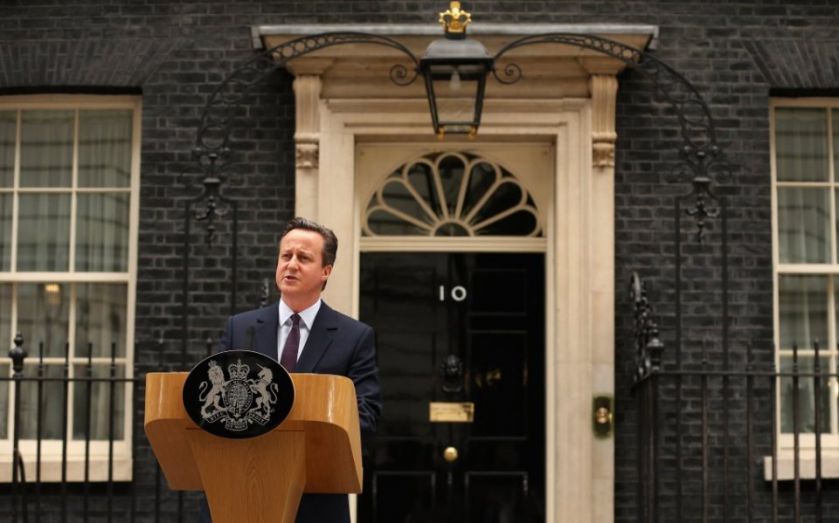General Election 2015: Shares, bonds and the pound all end higher after shock Tory win

Shares, bonds and the pound all rallied today after the Tories swept to a shock win in the General Election, sparing investors from the inevitable uncertainty which would have come with a round of coalition negotiations.
The FTSE 100 closed up by 2.2 per cent at 7,035 points this afternoon as the Tory party prepared to form a new government having won a slim majority.
This came after a jittery performance yesterday as investors eyed what was then dubbed the most uncertain election in living memory.
City analysts had excitedly said it would pop at the open, and the index didn't disappoint, opening up 1.1 per cent.
Half an hour to go, and FTSE100 forecast to start +130 at 7017.
— David Jones (@JonesTheMarkets) May 8, 2015
Ok so FTSE opens +2% trading at 7016 as banks stocks start to emerge from opening auction.
— Joshua Raymond (@Josh_RaymondUK) May 8, 2015
Bank shares saw big gains as Lloyds Banking Group closed up 5.5 per cent to 86.7 pence, while Barclays ended the day 3.6 per cent higher at 257 pence.
And energy firms were also lifted with British Gas owner Centrica closing up around 7.7 per cent at 277 pence, and SEE 5.2 per cent higher at 1,644 pence.
Meanwhile the FTSE 250 – which is Britain's mid-cap index – closed up 2.7 per cent to 17,916 points, having soared to a record high of 18,161 points earlier in the day.
Government borrowing costs also fell as the yield on the 10-year UK government bonds, or gilts, dipped by as much as 13 basis points at the open to a one-week low of 1.79 percent. It later closed down at 1.88 per cent.
Bond yields move inversely to prices, and when they fall, this shows investors think a security is less risky.
Sterling was up 1.4 per cent against the euro. Earlier it had jumped as much as two per cent, putting it on course for its biggest one-day rise against the euro since early 2009.
Last night a shock exit poll, published straight after voting closed at 10pm, had shown a surprising uptick in support for the Conservative party, with projections of the party winning as many as 316 seats – 10 seats up on their 2010 figure. Meanwhile, the Liberal Democrats were given 10 seats, a fraction of the 57 they won in 2010.

Across the City the prospect of five years of a business-friendly government was met with widespread relief.
"The markets are likely to be happy with the election result in the near-term and the economy should benefit from the more stable result than had seemed likely," Howard Archer, chief economist at IHS, said.
"The threat of a scarily left of centre, spend and tax coalition of Labour and Scottish Nationalists, dragging the UK back to hard left policies not seen since the 1970's, has evaporated," Nick Beecroft, senior market analyst at Saxo Bank, said.
Nonetheless many said a number of challenges lie ahead, namely the fact a possible "Brexit" still looms large, alongside potential in-fighting within the Tory party, and tensions with the SNP.
"It could be rocky. A Conservative government with only a small majority of seats will be vulnerable to defections, the inevitable losses in by-elections as well as to the antics of its potential small partners (LibDems and/or DUP)," Holger Schmieding, chief economist at Berenberg, said.
"Most importantly, a rebellion of anti-EU Tories against whatever terms the government may (try to) achieve in negotiations about a modest EU reform ahead of a late 2017 referendum could bring the government down."
Find out who won where using our General Election results map:
[custom id="10"]